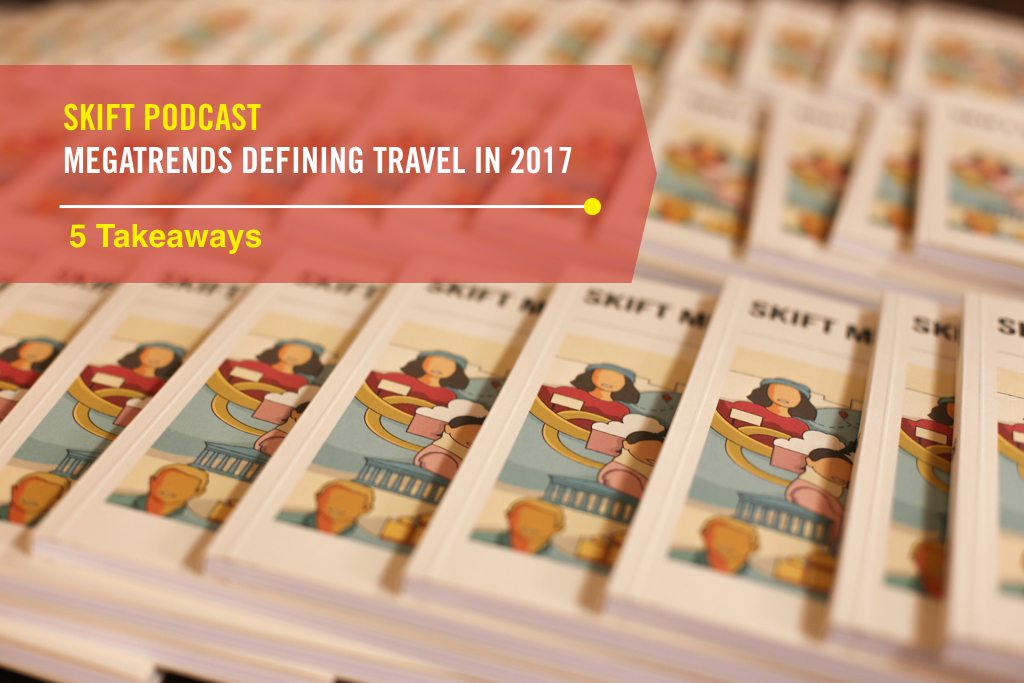Skift Take
Humanity is our focal point for 2017. As much as we love travel tech, which is crucial to the industry's evolution, human beings will have to remain front-and-center as well.
For a recent episode of the Skift Podcast, we examined our biggest annual editorial effort: Megatrends. In this project, we explored the most crucial concepts affecting the global travel industry in 2017. Read the full Megatrends magazine here.
The audio for this podcast episode came from this year’s Megatrends event, held in January at a WeWork space in Manhattan, with about 200 people in attendance.
Skift founder and CEO Rafat Ali and co-founder and editor-in-chief Jason Clampet delved into nine of our 15 megatrends and touched on topics including: how low-cost airlines are changing the transatlantic game, the festivalization of meetings and events, the return of humanity to travel, the rise of lean luxury, and tours and activities coming into their own.
Our Megatrends 2017 sponsors were MasterCard, UrLife, Smartling, Allianz, American Express, Four Seasons, and Hostelworld.
Here are five takeaways from the conversation:
Our focal point for 2017 is humanity.
We’re living in a mobile-first, digital-overload era. Unfortunately, over time, this myopic focus on tech can detrimentally separate the human beings who work in the travel industry from the human beings who travel. Remembering and prioritizing those human connections will be increasingly important for all sectors.
Rafat Ali explained, “You can see the extreme effects of a digital-led life, not just in travel, but everywhere, which is essentially this pervasive tyranny of distraction… human empathy is something the travel industry should look at again, and not just chase tech for the sake of chasing tech.”
“Consumers are looking for places where they’re not just data points,” said Jason Clampet. “We’ve seen Four Seasons has always done that, focused on personal connection as opposed to the earning of points. We see Hyatt doing that as well in hospitality. We’ve also seen some of the cruise lines doing that.”
Voice search is going to break us out of the search box.
Virtual reality made many headlines in 2016, but starting now, voice search is going to open more doors for the industry. We’re so accustomed to using that search box, but voice search is going to infuse that stale digital process with a human element.
Ali recalled, “Earlier last year at the Skift Global Forum the CEO of Expedia, Dara, I asked him a question on stage: if he were to leave Expedia today and to start a new company, essentially to kill Expedia or Priceline, what would he work on? He actually gave a real answer to it. He said that, ‘Incremental changes won’t work. So, if I were to focus something, I would focus very much on voice search, which is a completely different way of interacting.’”
Booking tours and activities is about to get more sophisticated.
Tours and activities have long been the realm of last-minute, in-person, on-paper bookings. Big players like TripAdvisor are now betting that tours and activities can be reliably booked online in-advance, just like hotels and flights.
“There are many, many smart people with very, very deep wallets who are focusing on this field, who will start to connect the dots in ways that haven’t been connected yet,” said Clampet.
Overtourism is officially a serious problem
Tourism can be a powerful economic driver, and we see time and again that when tourism really explodes in an unprepared destination, negative effects follow. Destinations will have to increasingly think about sustainability, rather than focusing singularly on ramping up those visitation numbers. Take our investigation of Iceland as a case study.
Ali reflected on a Skift company retreat to Colombia. “Caring for locals first over tourists has worked for many cities like Medellin,” he said.
Luxury is no longer about opulence.
Many new luxury products don’t resemble that old vision of classic luxury, which is all about conspicuous consumption. Luxury is taking on a new, deeper, more subtle meaning — it’s not needlessly flashy, but the incredible quality is there, and the product has a story.
“[New luxury companies] talk a lot about their provenance. They have a sense of community in so many ways. They have a sense of craftsmanship about them, and actually the craftsmanship shows,” said Ali.
“It’s highly personalized, it’s part of a story, and it thinks of luxury in different ways.” added Clampet.
Start listening to The Skift Podcast, today. Subscribe via iTunes, Soundcloud or RSS.
The Daily Newsletter
Our daily coverage of the global travel industry. Written by editors and analysts from across Skift’s brands.
Have a confidential tip for Skift? Get in touch
Tags: megatrends 2017
